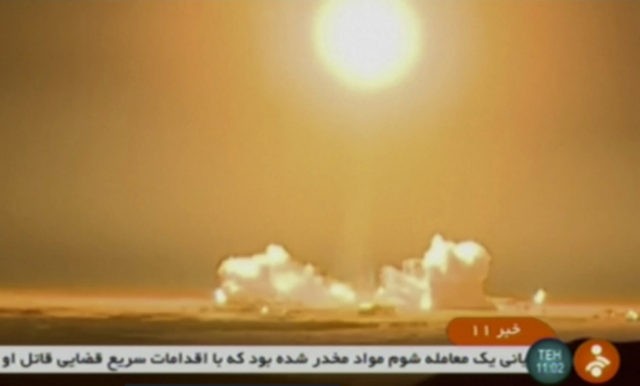Iran launched a satellite into space Tuesday that failed to reach orbit and is preparing to deploy another one in the coming days, state-run media from the Islamic Republic reports.
The satellite launches follow turbulent months for Iran’s economy, which is buckling under economic sanctions reimposed by the United States in November.
“We are not scared by the enemies’ plots and will overcome the existing problems,” Iranian President Hassan Rouhani declared on Monday, according to Radio Farda, a component of Radio Free Europe/Radio Liberty.
He added, “The U.S. and its allies cannot bring the Iranian nation to its knees.”
The United States and France have explicitly cautioned Iran against sending satellites into orbit, citing concerns that Iran is ultimately seeking to launch weaponized objects.
U.S. officials have also argued that sending satellites into space violates several United Nations Security Council resolutions including number 2231, which calls on the Islamic Republic “not to undertake any activity related to ballistic missiles designed to be capable of delivering nuclear weapons, including launches using such ballistic missile technology.”
“Based on the resolution, if Iran violates it, all sanctions previously imposed on Iran that were lifted following the 2015 nuclear agreement will be re-imposed on Tehran immediately,” Radio Farda notes.
Although U.S. President Donald Trump pulled America out of the controversial nuclear pact, the other world powers that signed on to it remain committed.
U.S. Secretary of State Mike Pompeo recently warned Iran to stop its plan to launch ballistic missiles into orbit. Moreover, a spokesman for the French Foreign Ministry also urged Iran to abort the idea to deploy “nuclear-capable missiles” into space. Nevertheless, Rouhani on Monday confirmed that Iran was planning to send two domestically-built satellites into orbit.
Iran argued that the satellite launched Tuesday was expected only to collect environmental information to boost the country’s forecasting system.
“Boasting about Iran’s scientific progress and its leaders’ defiance in the face of serious international warnings could be a way of portraying the Islamic Republic as a powerful state on its 40th anniversary in February,” Radio Farda notes.
Iran’s alleged plan to portray the Islamic Republic as a “powerful” country with its satellite launch appears to have backfired.
The Islamic Republic’s state-run Press TV concedes, “Technical problems that occurred during the final stage of the launch prevented the spacecraft from reaching orbit.”
Mohammad Javad Azari Jahromi, Iran’s telecommunications minister, acknowledged the failure via Twitter on Tuesday.
“The Payam (Message) satellite was successfully launched this morning aboard the satellite carrier. But the satellite, unfortunately, failed to be placed in orbit in the final stage,” the minister said.
Iran, however, is planning to launch another one — a low-Earth-orbit satellite named Doosti, meaning “friendship.”
“This time, with extra efforts, we are going to show the world that Doosti will be a success,” Jahromi proclaimed.
In response to Western concerns that the Islamic Republic is trying to militarize outer space, Iran provided “assurances that there is no military aspect to its satellite activity and that its missile tests are in no way banned under the nuclear agreement nor the UNSC resolution, because the missiles are not designed to deliver nuclear warheads,” Press TV points out.

COMMENTS
Please let us know if you're having issues with commenting.